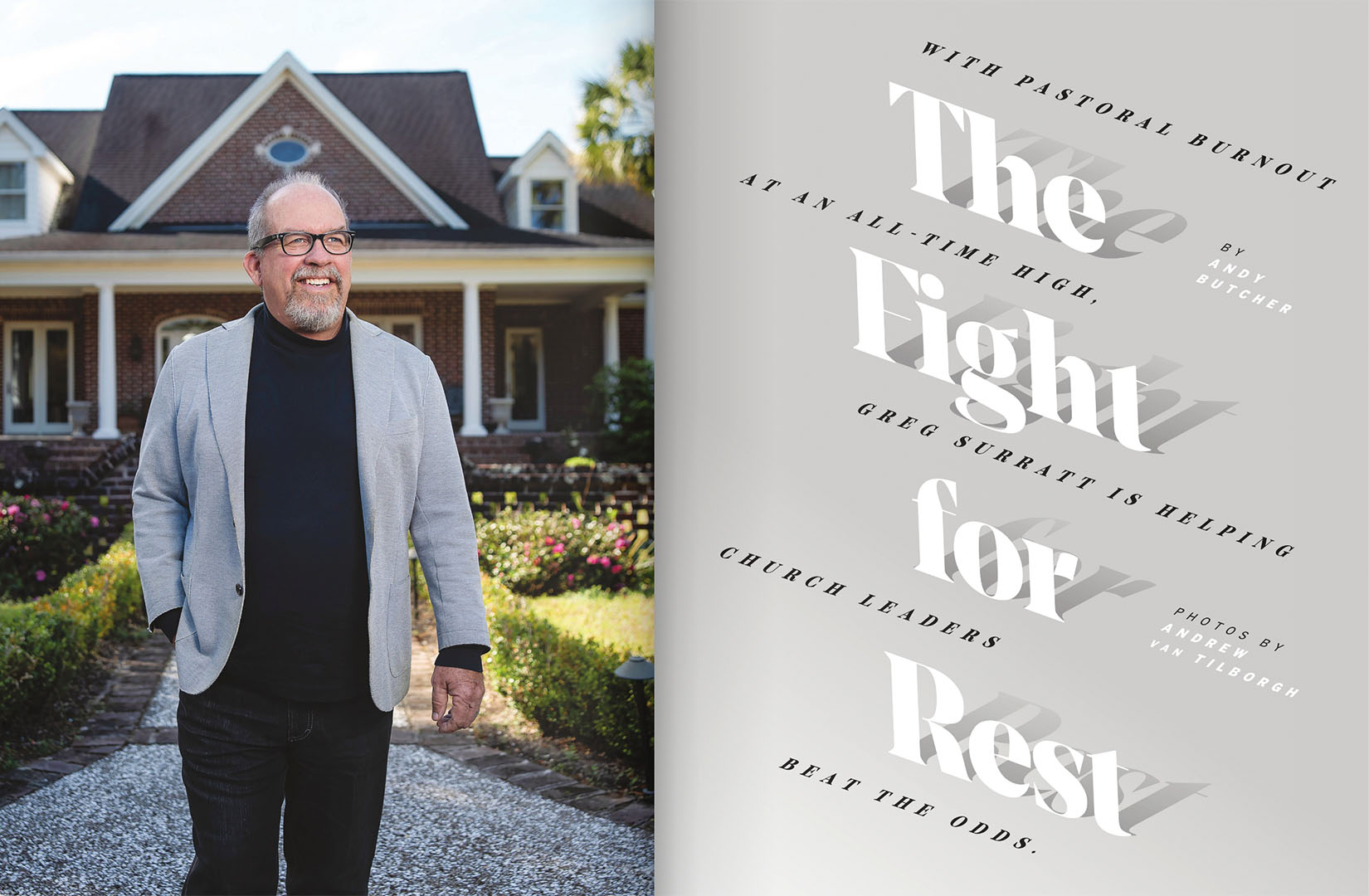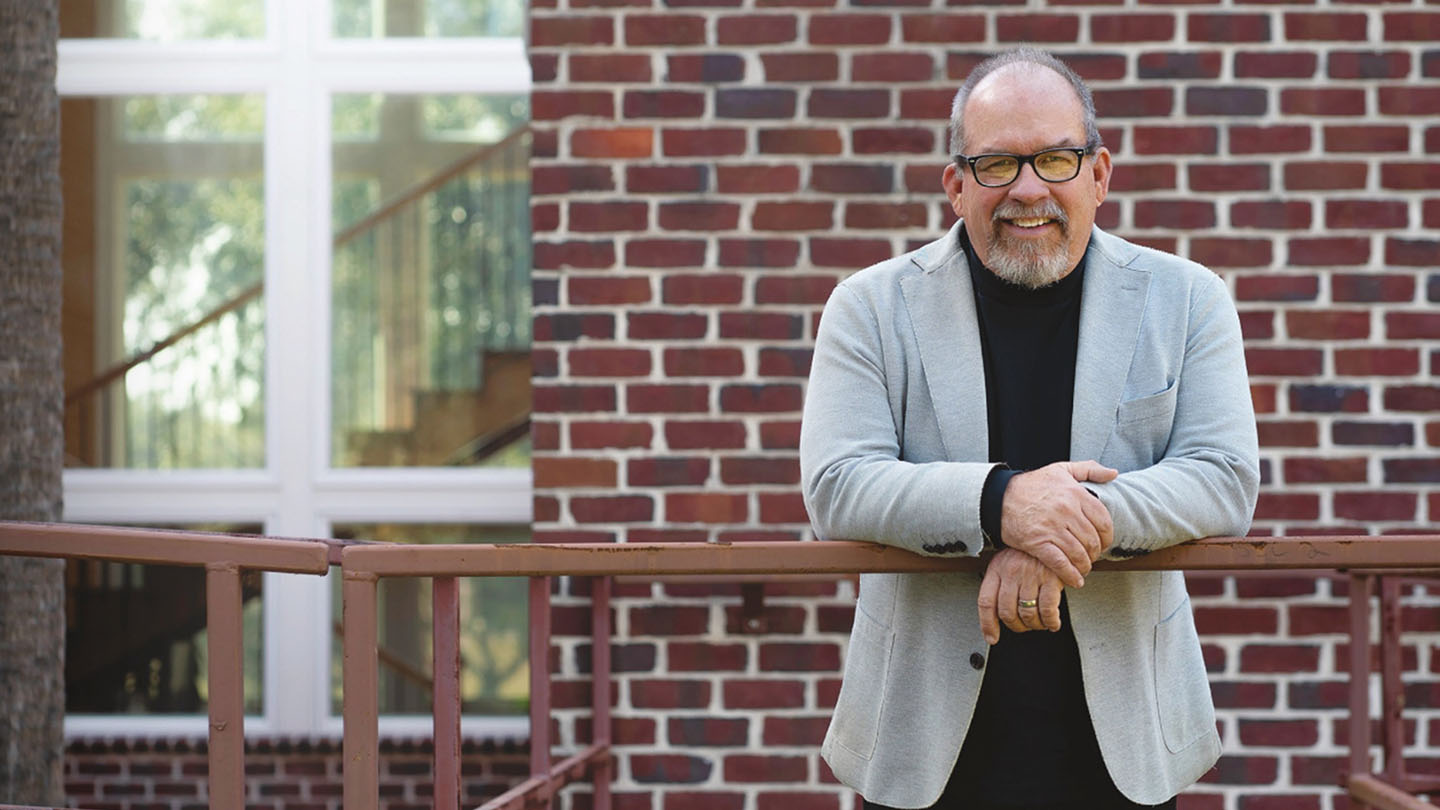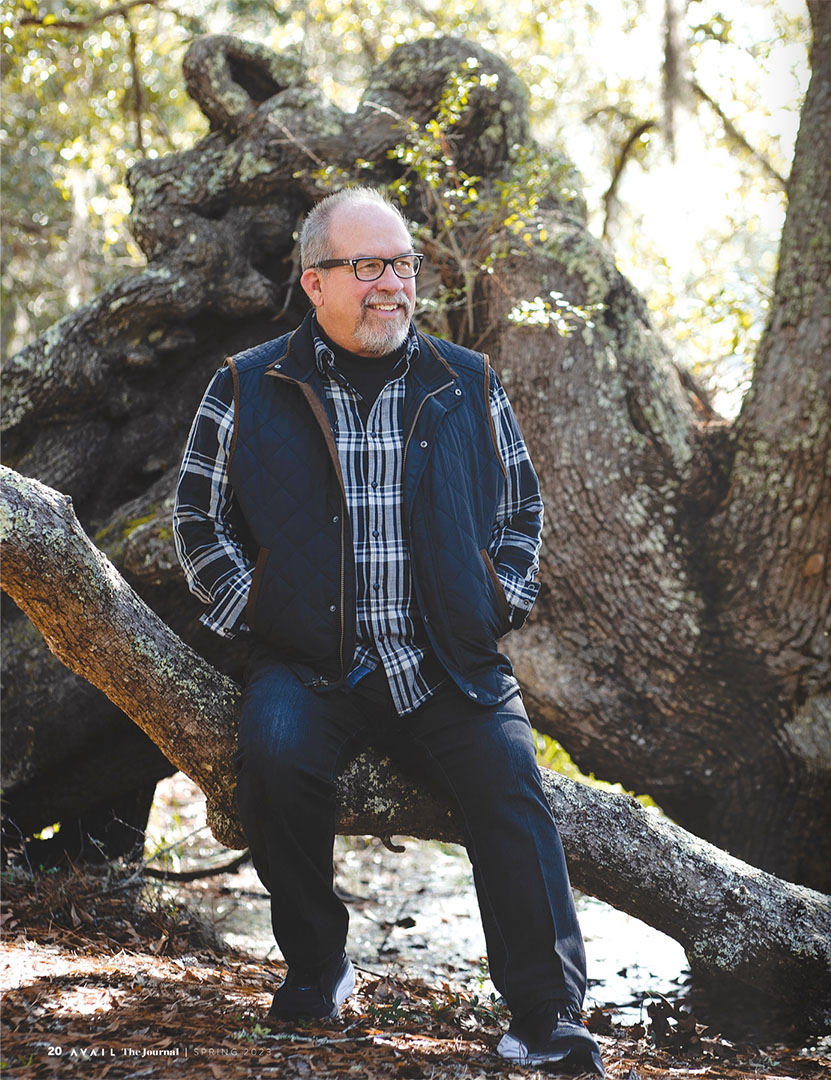
With pastoral burnout at an all-time high, Greg Surratt is helping church leaders beat the odds.
Greg Surratt still remembers the deep hole he found himself in early in ministry. Just a few weeks into taking on his first pastorate in rural northern Illinois, in his early 20s, he slid from discouragement into a deep depression, “the kind of thing that you don’t get out of bed for.”
With no one else to turn to other than his wife and his pastor-father, over the course of the next six months he managed to climb out of that ditch. A book about cognitive therapy helped him recognize some of the lies he was believing about himself and how they affected his mental well-being.
There have been tough times since then in the course of more than four decades of church planting and leadership, naturally, but nothing like that first bone-crushing experience. “It’s what probably drives me toward helping others,” he says of the pastor-care initiative he now heads. “I don’t want any pastor out there at a small church to be feeling discouraged and that there’s nobody they can talk to.”
With the movement he helped found now having started more than 1,000 churches, Surratt is turning his attention to ensuring that their leaders are equipped to survive the long haul. ARC has done “a really good job of teaching pastors how to plant churches, and I think we’re getting better and better at it,” he says. “Now, in this next season, we’re going to keep doing that, but we’re going to get really, really good at helping pastors be healthy and finish strongly.”
Surratt’s pastoral care mission is not so much a refocusing of the vision that inspired his founding of the widely-admired multisite Seacoast Church, in Charleston, South Carolina (where he turned the leadership over to his son, Josh, almost a decade ago), and ARC, as a refining of it. The ultimate goal is still a life-giving church in every community, but one that is built on a solid foundation. “Everything rises and falls with leadership,” he says, quoting leadership expert John Maxwell. “And if the leader isn’t healthy, the church is going to suffer. So, we’ve got to train leaders how to be healthy.”


He’s doing that at The Retreat at Church Creek, which brings a dozen or so pastors at a time to a stretch of waterfront land just outside Charleston. There’s fishing, disc golf, nature trails and a gun range. It’s a time to relax, reflect and reset. Each evening there’s a group meal when participants start to get real about what’s going on in their lives.
“I don’t know how many times I’ve heard a pastor say, ‘I’ve never really talked to anybody about this,’” says Surratt. “We have a lot of honest conversations and come out at the end with a sense of the beginning of healing, and at least a temporary addressing of stress.”
Those days are intended to be the first step in an ongoing journey toward greater wholeness. Surratt likens the getaway to triage: assessing the wound and what needs to be done to treat it effectively. At the end of the four-day retreat, participants are encouraged to become part of a cohort with some of the others who have attended. Those smaller groups meet online over the coming months for follow-up conversations.
LOOKING CLOSER
The retreat is free and open to pastors from any stream—a recent gathering included pastors from Baptist, charismatic and ARC-related churches—and of any size, though its emphasis is on leaders of smaller congregations. Ninety-four percent of churches in America have fewer than 500 members, Surratt says: “These guys are doing all the work, and they oftenentimes don’t have the resources to go and do the kind of work that we’re talking about doing.” Several hundred pastors have already taken part in one of the retreats over the past 18 months, with Surratt’s goal to help 10,000 over the next five years.
He knows well that, even as the stigma around mental illness diminishes—though perhaps less among those in ministry, who may feel admitting to such struggles could make them seem unspiritual—it can still be hard to know if and when someone is really having a hard time.
Surratt’s first efforts in the area of pastoral care were made with Darrin Patrick, with whom he founded the nonprofit The Pastors Collective, which now runs The Retreat. A rising star in the evangelical world, Patrick started The Journey, a growing multisite church in St. Louis, Missouri, where he was chaplain to the Cardinals baseball team. A popular author and speaker, he was also involved in leadership positions with the Acts 29 Network and The Gospel Coalition.
After being let go by the church in 2016 for “pastoral misconduct,” Patrick went through a restoration process Surratt was part of and later joined Seacoast as a teaching pastor. The two men launched The Pastors Collective podcast to tackle issues related to church leaders’ emotional and spiritual health.
Surratt was stunned when Patrick took his own life in May 2020. “It was devastating,” Surratt says. “I have no idea what Darrin was thinking. There were a lot of things going on, and I don’t know if it was a long-planned thing or just all of a sudden, in a moment, but it has taught me to look closer . . . when I hear what sounds like deeper than just the kind of surface discouragement we all go through.”
Patrick’s death spurred Surratt to want to do more to help others who may be struggling. His concern was further galvanized by a 2021 Barna Research study that revealed high levels of burnout among pastors. The organization found 38% of respondents had considered quitting full-time ministry in the previous 12 months—up nine points from the start of the year.
Going deeper, the study also found that 46% of pastors under the age of 45 had said they had thought about leaving the ministry, compared to 34% of older pastors. “Keeping the right younger leaders encouraged and in their ministry roles will be crucial to the next decade of congregational vitality in the U.S.,” Barna Research warned.
Surratt echoes that concern. “The numbers are staggering,” he says. “There are 350,000 churches in America, and if you took nearly half of those out . . . we need more churches, not less, more pastors, not less.”

PROCESSING DISAPPOINTMENT
Those Barna findings were made during the COVID-19 pandemic, of course, which perhaps understandably may have magnified the existing strains of ministry. The stress level may have abated some since: According to a LifeWay Research study last year, 26% of Protestant pastors in the United States said they had personally struggled with some type of mental illness.
But this issue “has been at alarming levels, and the delta every year gets bigger, for the last four or five years,” Surratt says. “COVID just blew the top off of it. COVID was what I call the single biggest leadership challenge that I’ve ever seen in my 40-some years of being a Pastor.”
Having to pivot to online ministry virtually overnight was enough of a challenge by itself, but it was only part of a perfect storm. Then there was the racial unrest sparked by the murder of George Floyd, an acrimonious election season and polarized opinions about masking and vaccines when in-person life resumed. “It all came to church, and people had an opinion on everything,” Surratt notes.
Those firestorm issues may have abated some, but pastors are still feeling the heat post-COVID, he believes—for instance, having to deal with the way the pandemic has changed churchgoing habits. And then there’s another election season on the horizon, which promises to be as contentious, if not more, than the last. So, stress levels for pastors remain high.
The pulpit has always come with its own pressures: preaching week in and week out, coping with criticism, financial pressures (church and personal), staff conflicts and the ongoing burden of dealing with others’ pain. But Surratt believes they have been exacerbated by the impact of social media. It’s easy to see another pastor’s highlight reels and be discouraged that your church doesn’t seem to be enjoying the same growth. And people are quick to post criticism.
“When people leave the church, it always hurts,” Surratt says, but “when I first started pastoring, you might not hear about it. They’re just gone, or somebody writes you a letter. These days they put it on social media for all their friends to see: ‘We found a new church. It’s awesome. They’re actually preaching the gospel.’ A pastor sees that and how do you process it?”
Surratt has some advice for churches wanting to better support their pastor: rest, remuneration and resources.
“You’d be surprised at how many pastors don’t take a day off ,” he says. “Not only do they need a day off every week, they need time off just to rest and regenerate, and that doesn’t happen in a one-week vacation or a two-week vacation.”
Churches also need to pay their pastors enough so they can take time out to recharge and aren’t constantly living under the stress of not making enough money. “I would love to see churches put leadership mental health in their annual budget,” he says. “We’ve got budgets for missions everywhere. Well, if the leader at home burns out, there’s going to be less missions everywhere.”
There should also be resources available for soul care—retreats, sabbaticals and counseling that’s available as an ongoing, preventive support rather than just a crisis response.
As an aside, he suggests churches should have an “attaboy” or “attagirl” who serves as a kind of informal Barnabas. He tells of someone in his church who sends him an encouraging text or email every day. “Every day I can count on, if nothing else, this guy is going to send something encouraging. I look forward to that.”
FACING SHAME
Surratt’s concern isn’t just for pastors but for their churches, when poor mental health spills over into poor moral choices. “The whole church becomes traumatized when you have a moral failure,” he says. “That then ends up in abuse of position and abuse of people, and we’ve got to deal with that.”
If there’s a similar thread running through the lives of many pastors who are dealing either with mental health issues or having made wrong choices in their discouragement and burnout, it’s shame.
“What’s interesting is when you get around a table with other people who are pastors, who do what you do, the most healing thing you can hear is, ‘Me too.’ Somebody shares, ‘I’m struggling with this,’ and somebody over here goes, ‘Me too,’” Surratt says. “And suddenly, I’ve seen it happen time and time again, there’s hope. ‘I’m not the only one.’ Part of what we do is we have a safe space where guys can say how they really feel.”
There is, of course, a spiritual dimension to all this. “If you were opposed to the church, who would you attack? You attack leaders,” Surratt says. “I joke around sometimes and say before I became a pastor everybody liked me. When I started being a pastor, I immediately had opposition that I’d never felt in my life, and I think that’s deeper than people.
“I think that’s the enemy of our soul [who] works every day trying to get us to believe things that are a lie. His means of operating is often through my thoughts, and he will get me to think about and to meditate on—and then to agree with—something, that’s just not true. It’s not what Jesus is saying about me, it’s not what the Holy Spirit has for me, and yet it’s controlling my life because I believe that it’s true. And that’s spiritual warfare.
“At the retreats, one of the things we do is pray for one another, and it’s just beautiful to watch guys gather, pray for one another and then begin to speak the truth to and over each other.”
If there’s a single text that underpins Surratt’s pastoral mission, it’s Matthew 11:28, where Jesus says, “Come to me, all you who are weary and burdened, and I will give you rest.”
“I love technology, and I think it can be a tool to help, but we’re going to have to fight for the rest that Jesus promises because our culture, even our church culture, doesn’t promote rest,” he says. “It promotes activity and all that’s involved in that. We lean on that [Matthew] scripture . . . that’s what we’re in business for, to help weary pastors, leaders, get the rest they need, the refreshing they need, so that they can live well and finish strong.”

LeadRX
If you’re a pastor going through a hard time, here are three questions Greg Surratt suggests you ask yourself to gauge your mental health.
How are you doing? Be honest: How are things under the hood? Do you sometimes feel like just getting in your car and driving away?
Who are you telling? Have you been honest with your spouse? Do you have anyone you can call and be really real with?
What are you using? Are there ways you’re self-medicating, whether that’s alcohol, pills or pornography or something else that temporarily soothes you?
RELAX. RECHARGE. RECONNECT.
When Eddie Ayers arrived at The Retreat, he was running on fumes. Stepping into senior leadership at Faith Church in Winfield, Alabama, over the past 18 months, during which time the church had doubled in size, had drained him.
“I thought, I don’t really have time for this right now,” he admits when the idea of taking time out was first suggested, but he is glad he went. “It was life-changing,” he says. “I showed up empty, and I left with my cup running over—I was filled back up mentally, physically and spiritually. I left ready to fight hell with a water pistol.”

Though he wasn’t dealing with any major personal issues, time to reflect and the mealtime conversations with The Retreat leaders revealed some things he needed to address: “I needed to forgive some people, and I needed God to do some things in me and that happened around that table.”
Ayers has paid it forward for five other pastors to attend a retreat. “On a five-star rating, I’d give it 20, I think it’s that awesome,” he says. “Yeah, there’s awesome food. Yeah, there’s great connections with other pastors. And there’s just an anointing; there’s a presence of the Holy Spirit at that place, a healing presence.”
As a veteran (Operation Iraqi Freedom), he agrees with those who say that pastoring can bring its own kind of PTSD. “It’s a war,” he says, “and a pastor’s life can be very lonely sometimes.” One of the lasting benefits of the retreat has been the connections he has made with other pastors. “This retreat let me know I’m not in this thing alone,” he says. “That I have people, I have other pastors who are willing to stand beside me and pray with me and help me even through the difficult times.”
Connecting with other pastors is one of the takeaways for Jose Vasquez, too. The pastor of Church at the Bridge in Newburgh, New York, reached out to other church leaders in his community after his time at The Retreat. Busyness and concern about what others might think if he spoke about difficulties had previously kept him from being too open.
“Now I have relationships where we do more than just talk about ministry and catch up on our ministry,” he says. “We actually talk about life, we actually talk about how you really are doing. I’m more transparent, not just in my ministry relationships, but even with the people that have been entrusted to me in ministry. I’m candid: ‘Hey, this is where I’m at.’”
Vasquez speaks gratefully of The Retreat’s welcoming churches like his and Ayers’ that are outside of ARC, and its big-picture vision. “That’s a testimony to what they are doing,” he says. “When you resource a pastor in that way, you don’t just resource a pastor, you resource his home, you resource his church and by default you resource the community around the pastor.”
—
This article was featured in the Spring 2023 AVAIL Journal.
Andy Butcher is Editorial Director at Four Rivers Media. Andy and his wife, Marcia, live on Florida’s Emerald Coast.


